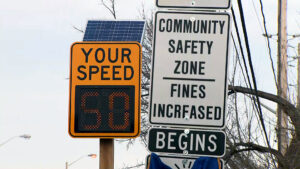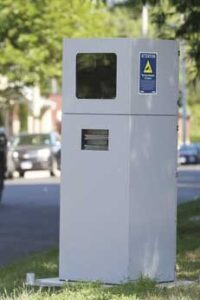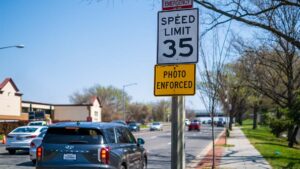
The City of Toronto may soon take over the enforcement of red light running and camera traffic speed enforcement.
The City of Toronto is looking at taking over the operations of the traffic red light running and camera automated speed enforcement system from the province.
City officials said a body will be established to hear appeals and quicken processing times for tickets.
The issue will be considered by an Infrastructure and Environment Committee on January 9 and by City Council on February 6.
If given the green light, City officials will establish a system of administrative penalties for Red Light Camera and Automated Enforcement violations to take effect on November 1.
The tickets are now regulated by the Ontario government under the Highway Traffic Act.
A City Administrative Penalty Tribunal will be established to hear appeals or dismiss tickets. The City will be able to set penalties for different violations which includes speeding and running red lights.
Some 25 Screening Officers, who will be City employees, will be appointed to hear cases and review penalties, according to a committee proposal.
“The new system will replace a legacy application that is nearing end-of-life with a scalable solution that provides online tools for customers and permits the addition of new types of contraventions,” according to the plan.
The City will enter into an agreement with the Ontario’s Transportation Services to access and use of licence plate registration information for red light and speed violations.

A speed camera similar to this is among the busiest in Toronto issuing more than 21,000 tickets in 10 months that generated almost $2.3 million.
An agreement will also be obtained for the City to access the Defaulted Fines Control Centre to refuse to issue or validate vehicle permits or unpaid penalties for red light or speeding offences.
The City also plans to enter into agreements with municipalities for the cost-sharing of the expenses of processing speeding penalties.
The City Solicitor will be authorized to make any necessary clarifications, refinements, modifications, technical amendments, or by-law amendments as may be identified in the program.
The proposal said the City now spends about $16.2 million on operating costs for processing red light camera and automated speed enforcement tickets. The City is expected to generate $68.68 million in revenue from charges issued last year.
The city plans to increase the number of automated speed enforcement cameras from 75 to 150 by 2026 and increase its budget for the processing of dispute resolutions from $16.2 million to almost $50 million by 2026.

The City will be making agreements with the province to use their databases to enforce the rules for those who do not pay their fines.
The City argued an Administrative Penalty System can process the tickets faster than in provincial offences court and allow more online service delivery.
The committee was told that in 2021, it took an average of 68 days to conclude the first dispute stage for parking penalties, compared to 225 days in 2016.
It “will assist in alleviating much of the frustration experienced by the public with the current court-based program,” the proposal states.
The chair of the tribunal will be paid $25,000 yearly and members will receive $460 for a full-day per diem, or $275 for hearings, meetings or training session. They will receive an annual stipend of $1,500.
A lot of revenue is on the line considering that in the first 10 months since a camera was installed on Parkside Dr. in April 2022, some 21,252 tickets were issued for speeding infractions.
The average fine in Toronto of $107 per ticket, meaning the city has accrued an estimated $2,273,964 in revenue from this lone traffic camera.
The camera was installed and the speed limit on Parkside Dr. lowered to 40 km/h after the deaths of Fatima and Valdemar Avila in a five-vehicle collision in October 2021

